Christopher Tolkien died in 2020. He was the son of J.R.R. Tolkien, the author of “The Lord of the Rings” and “The Hobbit.” A longtime collaborator of his father’s and editor of many of his posthumously published works, he lived to be 96, long enough to see the production of Peter Jackson’s blockbuster “The Lord of the Rings” trilogy. His reaction to the New Zealander’s phenomenally successful adaptation of his father’s oeuvre was not favorable.
“The chasm between the beauty and seriousness of the work, and what it has become, has gone too far for me,” he told French newspaper Le Monde in 2012. “Such commercialization has reduced the aesthetic and philosophical impact of this creation to nothing. There is only one solution for me: turning my head away.”
A decade after that stinging review, another Tolkien-inspired production has arrived: Amazon Prime Video’s “The Lord of the Rings: The Rings of Power,” available on streaming Sept. 2
The series brings to screens for the first time the heroic legends of the Second Age of Middle-earth, set thousands of years before the events of “The Lord of the Rings”: a time that saw the rise and fall of the great island kingdom of Numenor, the return and first defeat of the evil Lord Sauron, and the forging of the titular Rings of Power.
This monumental production (with a $715 million price tag, according to The Wall Street Journal) is garnering lots of attention, along with scorching criticism from Tolkien experts and diehards. Should we turn our heads away?
I previewed the first two episodes of The Rings of Power. It is visually impressive, with gorgeous scenery; the soundtrack is almost at the level of Howard Shore’s legendary score for the Peter Jackson trilogy, and the story is told with an engaging script.
How close is the show to Tolkien’s original writing? That’s impossible to say. The history of the Second Age is sketched out briefly in the Appendices to “The Lord of the Rings,” and some additional elements from the era are supplied by a few other of Tolkien’s works.

That gave Amazon plenty of blanks to fill, and filled them it has. While the bare bones of the story and some of its core characters (including the “Rings” trilogy’s Galadriel, Elrond, Sauron) are Tolkien’s, the rest is all up for invention: events, individual plotlines, and many more characters.
So, how do you make audiences believe they are watching Tolkien? First, the show is kept entirely consistent with Peter Jackson’s movies. The visuals, scenery, costumes, the soundtrack: everything feels like a spinoff from the earlier cinematic adaptation.
Second, the authors have copy and pasted some ideas, themes, and characters from the works of Tolkien. We encounter a young Harfoot girl who, unlike the rest of her people, is curious and wants to see the world — much like Frodo and Bilbo of “The Lord of the Rings.” There is conflicted love between an elf and a human — much like Arwen and Aragorn from “The Lord of the Rings.” You get the idea.
Still, there appears to be little of Tolkien’s “aesthetic and philosophical impact,” at least judging from its first two episodes.
The show tries to convey Tolkienian themes here and there, like the notion that things do not happen to people by chance, or that true bravery consists in responding to a call that manifests itself through concrete people and events. But these Tolkienian ideas feel somewhat watered down, domesticated, often reduced to feel-good platitudes (“follow the light,” etc.).
What is missing is what makes Tolkien history’s greatest fantasy writer: the mark of his own original “philosophy.” Not Tolkien’s own philosophical ideas, but rather the eternal truths about human beings and their destiny that are expressed through his stories.
The events that lead to the forging of the rings, which are created to wield power, are crucial to Tolkien’s worldview. Men want power to ward off death. Through the rings, the Numenorean kings of the Second Age seek to make themselves immortal. The elves, on the other hand, want to use power to block the progression of history. Their goal is to keep Middle-Earth as it is, a beautiful garden in which they can preserve what they love and enjoy their creations.

This longing to safeguard what exists is what motivates the elven queen Galadriel’s actions in Tolkien’s original design — in the Amazon show, she is merely seeking revenge for the death of her brother. Ultimately, however, these attempts to control time and death are misguided in their desire to arrest the decline that is inherent in the passing of time, the elves are, in Tolkien’s words, “oppressed by sadness and nostalgia,” for to refuse change is to go against the design of God.
In “The Lord of the Rings,” Gandalf, Galadriel and Elrond, who originally possessed the three elvish rings, are faced with the opportunity to seize the one ring and use it for good, but all of them renounce it. Why? They have realized that using power to preserve what is one’s own eventually produces only solitude and death.
They understand that the mysterious force that ultimately governs the course of history has an entirely different plan, one in which power is defeated by weakness. In this plan, renouncing power and the urge to keep everything for oneself, bears a fruit of life and love that beats the passing of time. None of these concerns seems to have left the faintest trace on the Amazon show.
The parallels between the events of Tolkien’s Second Age and those of our times are too obvious to be ignored: the conflict between good and evil, the seductive force of power afflicting good and bad alike; a long time of relative peace giving way to conflict and uncertainty.
One would hope that the Amazon series will convey what Tolkien would have suggested in these times: that power will be defeated by weakness, not by force, that the humble will triumph, that God has a plan for salvation invisible to the eye of the mighty, and that renouncing oneself and letting the light shine on others bears a fruit for eternity.
Instead, I fear, we will get plenty of entertainment — but in the end, little more than that.

